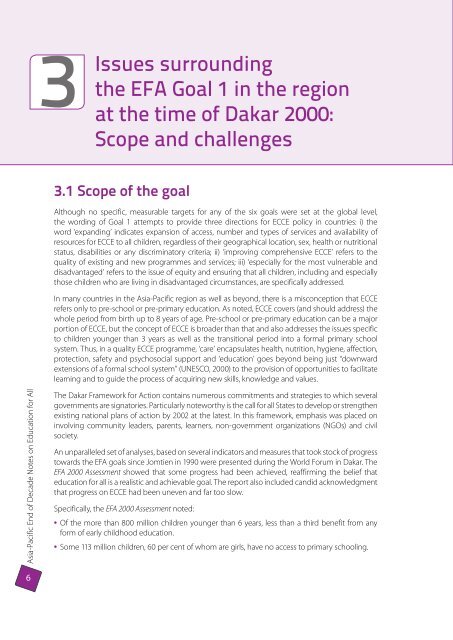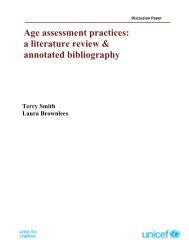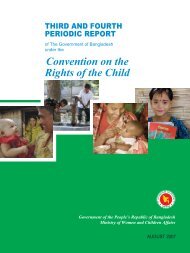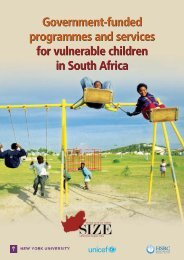EFA Goal 1: Early childhood care and education; Asia ... - Unicef
EFA Goal 1: Early childhood care and education; Asia ... - Unicef
EFA Goal 1: Early childhood care and education; Asia ... - Unicef
Create successful ePaper yourself
Turn your PDF publications into a flip-book with our unique Google optimized e-Paper software.
3<br />
Issues surrounding<br />
the <strong>EFA</strong> <strong>Goal</strong> 1 in the region<br />
at the time of Dakar 2000:<br />
Scope <strong>and</strong> challenges<br />
3.1 Scope of the goal<br />
Although no specific, measurable targets for any of the six goals were set at the global level,<br />
the wording of <strong>Goal</strong> 1 attempts to provide three directions for ECCE policy in countries: i) the<br />
word ‘exp<strong>and</strong>ing’ indicates expansion of access, number <strong>and</strong> types of services <strong>and</strong> availability of<br />
resources for ECCE to all children, regardless of their geographical location, sex, health or nutritional<br />
status, disabilities or any discriminatory criteria; ii) ‘improving comprehensive ECCE’ refers to the<br />
quality of existing <strong>and</strong> new programmes <strong>and</strong> services; iii) ‘especially for the most vulnerable <strong>and</strong><br />
disadvantaged’ refers to the issue of equity <strong>and</strong> ensuring that all children, including <strong>and</strong> especially<br />
those children who are living in disadvantaged circumstances, are specifically addressed.<br />
In many countries in the <strong>Asia</strong>-Pacific region as well as beyond, there is a misconception that ECCE<br />
refers only to pre-school or pre-primary <strong>education</strong>. As noted, ECCE covers (<strong>and</strong> should address) the<br />
whole period from birth up to 8 years of age. Pre-school or pre-primary <strong>education</strong> can be a major<br />
portion of ECCE, but the concept of ECCE is broader than that <strong>and</strong> also addresses the issues specific<br />
to children younger than 3 years as well as the transitional period into a formal primary school<br />
system. Thus, in a quality ECCE programme, ‘<strong>care</strong>’ encapsulates health, nutrition, hygiene, affection,<br />
protection, safety <strong>and</strong> psychosocial support <strong>and</strong> ‘<strong>education</strong>’ goes beyond being just “downward<br />
extensions of a formal school system” (UNESCO, 2000) to the provision of opportunities to facilitate<br />
learning <strong>and</strong> to guide the process of acquiring new skills, knowledge <strong>and</strong> values.<br />
<strong>Asia</strong>-Pacific End of Decade Notes on Education for All<br />
The Dakar Framework for Action contains numerous commitments <strong>and</strong> strategies to which several<br />
governments are signatories. Particularly noteworthy is the call for all States to develop or strengthen<br />
existing national plans of action by 2002 at the latest. In this framework, emphasis was placed on<br />
involving community leaders, parents, learners, non-government organizations (NGOs) <strong>and</strong> civil<br />
society.<br />
An unparalleled set of analyses, based on several indicators <strong>and</strong> measures that took stock of progress<br />
towards the <strong>EFA</strong> goals since Jomtien in 1990 were presented during the World Forum in Dakar. The<br />
<strong>EFA</strong> 2000 Assessment showed that some progress had been achieved, reaffirming the belief that<br />
<strong>education</strong> for all is a realistic <strong>and</strong> achievable goal. The report also included c<strong>and</strong>id acknowledgment<br />
that progress on ECCE had been uneven <strong>and</strong> far too slow.<br />
Specifically, the <strong>EFA</strong> 2000 Assessment noted:<br />
Of the more than 800 million children younger than 6 years, less than a third benefit from any<br />
form of early <strong>childhood</strong> <strong>education</strong>.<br />
Some 113 million children, 60 per cent of whom are girls, have no access to primary schooling.<br />
6

















